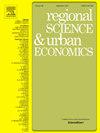Do housing booms reduce fertility intentions? Evidence from the new two-child policy in China
IF 2.9
2区 经济学
Q1 ECONOMICS
引用次数: 1
Abstract
To ease pressure from the aging population, the Chinese government implemented a two-child policy for couples where either the husband or the wife is from a single-child family in 2014. Using this policy as a quasi-natural experiment, we find that housing booms inhibit the potential desire for more children. A one-standard-deviation increase in the housing price-income ratio decreases the probability of migrant couples’ intention to have a second child by 7.69%, with the effect being concentrated on renters. Housing booms affect couples’ desired fertility through negative income and high opportunity cost channels. (JEL code: R31, J13, J38).
房地产繁荣会降低生育意愿吗?证据来自中国的新二孩政策
为了缓解人口老龄化带来的压力,中国政府于2014年对夫妻双方均为独生子女的夫妇实施了二胎政策。将这项政策作为一项准自然实验,我们发现房地产繁荣抑制了对更多孩子的潜在渴望。房价收入比的一个标准差增长会使流动夫妇生育第二个孩子的可能性降低7.69%,其影响集中在租房者身上。住房繁荣通过负收入和高机会成本渠道影响夫妇的预期生育率。(JEL代码:R31、J13、J38)。
本文章由计算机程序翻译,如有差异,请以英文原文为准。
求助全文
约1分钟内获得全文
求助全文
来源期刊

Regional Science and Urban Economics
Multiple-
CiteScore
5.30
自引率
9.70%
发文量
63
期刊介绍:
Regional Science and Urban Economics facilitates and encourages high-quality scholarship on important issues in regional and urban economics. It publishes significant contributions that are theoretical or empirical, positive or normative. It solicits original papers with a spatial dimension that can be of interest to economists. Empirical papers studying causal mechanisms are expected to propose a convincing identification strategy.
 求助内容:
求助内容: 应助结果提醒方式:
应助结果提醒方式:


